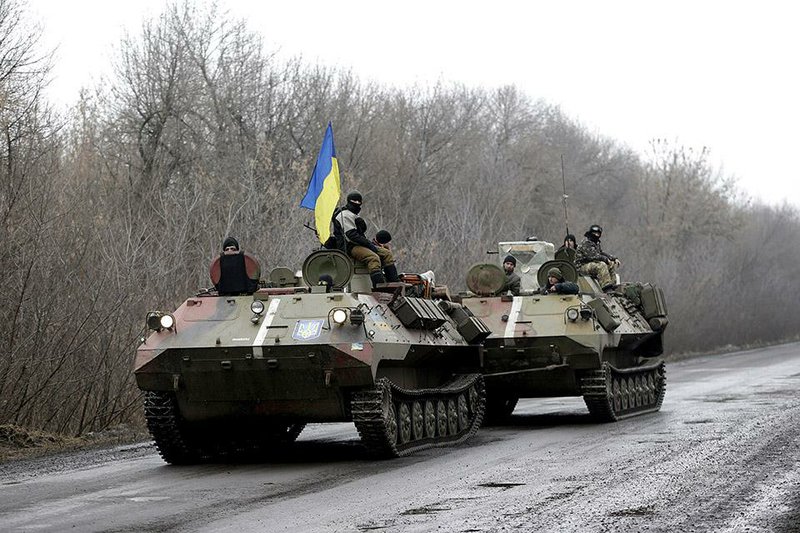DONETSK, Ukraine -- Artillery fire killed at least 12 civilians in the main rebel stronghold of Donetsk on Friday amid fierce fighting between pro-Russia separatists and government troops, as hopes for a break in hostilities were dashed when an attempt to call a new round of peace talks failed.
Five people were killed as they were waiting for humanitarian aid outside a community center, and two people were killed in the same neighborhood when a mortar shell landed near a bus stop.
Five other people died Friday in sporadic artillery fire in the west of Donetsk.
Full-blown fighting between the Russian-backed separatists and government forces began anew this month after a period of relative quiet. Debaltseve, a railway hub that could prove a crucial link between the main rebel-held cities of Donetsk and Luhansk, has become the main focus of hostilities.
Separatists inched toward Debaltseve on Thursday when they burst through government lines into the town of Vuhlehirsk. The press office for Ukraine's operations in the east said Friday that rebels were mounting artillery strikes on government checkpoints and bases in Vuhlehirsk.
"Precision strikes are destroying the opponents' firepower, manpower and machinery," the press office said.
The United Nations on Friday voiced concern about the deterioration of the humanitarian situation in Debaltseve and other densely populated areas in eastern Ukraine where fighting is going on. Neal Walker, the U.N. humanitarian coordinator in Ukraine, has called for an immediate humanitarian truce to allow aid deliveries and evacuation of civilians.
"Indiscriminate shelling of civilians violates international humanitarian law and must stop," he said in a statement.
Shells also rained down this week on the government-held town of Svitlodarsk, 12 miles north of Debaltseve, destroying gas pipelines, toppling electricity pylons and putting the local hospital out of commission.
Residents across Svitlodarsk stood in huddled groups around the front entrance to their apartment buildings by the steps leading to the basements, which are now doubling as bomb shelters.
"A shell hit a gas pipeline. They turned everything off," said 40-year-old welder Oleg Plashchechnik as he boiled water to make tea. "There is no power. But the children have to eat. We have to survive somehow."
Views among people in Svitlodarsk reflect the common split of attitudes across much of the war-stricken regions of Donetsk and Luhansk. While some said they support a united Ukraine, others spoke against the government for its role in a conflict that has claimed more than 5,100 lives, according to U.N. estimates.
While clashes in east Ukraine rage, hopes are still being invested in reviving a peace process that has been undermined with every new day of fighting.
Two rebel representatives went to the Belarusian capital, Minsk, for peace talks Friday but returned to eastern Ukraine a few hours later after the Ukrainian representative failed to turn up.
Leonid Kuchma, a former president who represented Ukraine in the previous rounds of talks, said the rebels must send their chiefs to the talks, while rebels, in turn, demanded that Kiev name a new envoy who will have more powers.
Donetsk rebel representative Denis Pushilin insisted that the rebels' ongoing offensive is a way to protect civilians from Ukrainian artillery fire and said they will go ahead with it unless Kiev stops shelling the rebel-held areas.
"The situation has worsened, and it is forcing us to go on offensive," Pushilin said. "New victims are inevitable, I'm afraid."
Pushilin said the rebels would be ready to resume the cease-fire that was brokered in September and withdraw heavy weaponry, as long as the demarcation line takes into account the rebels' recent advance.
Meanwhile, NATO plans to deploy small units in six eastern European nations to help coordinate a spearhead force set up in response to Russia's actions in Ukraine, the alliance's secretary-general said Friday.
Jens Stoltenberg said the units in Estonia, Latvia, Lithuania, Poland, Bulgaria and Romania will be the first of their kind there. Defense ministers from the 28-nation military alliance will discuss the full force, which can react quickly to any hot spots in Europe, when they meet Thursday.
The forward units will comprise a few dozen personnel only. They will plan and organize military exercises and provide command and control for any reinforcements the force might require.
France, meanwhile, is pledging tanks and armored vehicles to bolster NATO forces in Poland, where leaders are increasingly uneasy about Russia. The French military equipment is expected to remain in Poland for two months.
As tensions increased in Ukraine in 2014, NATO forces conducted about 200 military exercises, and Stoltenberg vowed that would continue as the alliance adapts to the increased presence of Russian warplanes in European skies. NATO intercepted Russian aircraft more than 400 times last year.
Information for this article was contributed by Yuras Karmanau, Sergei Grits, Nataliya Vasilyeva and Lorne Cook of The Associated Press.
A Section on 01/31/2015

